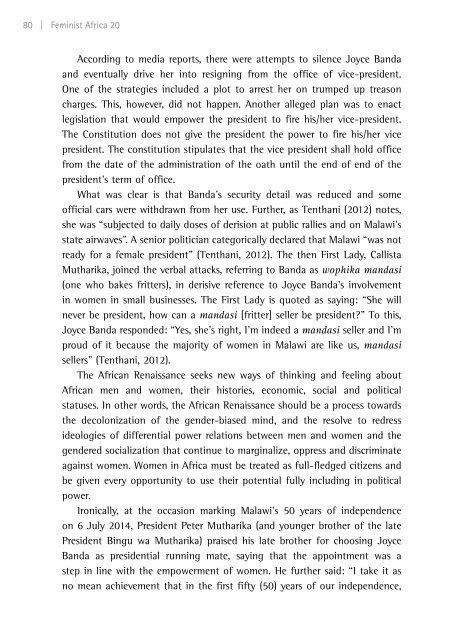Create successful ePaper yourself
Turn your PDF publications into a flip-book with our unique Google optimized e-Paper software.
80 | Feminist Africa 20<br />
According to media reports, there were attempts to silence Joyce B<strong>and</strong>a<br />
<strong>and</strong> eventually drive her into resigning from the office of vice-president.<br />
One of the strategies included a plot to arrest her on trumped up treason<br />
charges. This, however, did not happen. Another alleged plan was to enact<br />
legislation that would empower the president to fire his/her vice-president.<br />
The Constitution does not give the president the power to fire his/her vice<br />
president. The constitution stipulates that the vice president shall hold office<br />
from the date of the administration of the oath until the end of end of the<br />
president’s term of office.<br />
What was clear is that B<strong>and</strong>a’s security detail was reduced <strong>and</strong> some<br />
official cars were withdrawn from her use. Further, as Tenthani (2012) notes,<br />
she was “subjected to daily doses of derision at public rallies <strong>and</strong> on Malawi’s<br />
state airwaves”. A senior politician categorically declared that Malawi “was not<br />
ready for a female president” (Tenthani, 2012). The then First Lady, Callista<br />
Mutharika, joined the verbal attacks, referring to B<strong>and</strong>a as wophika m<strong>and</strong>asi<br />
(one who bakes fritters), in derisive reference to Joyce B<strong>and</strong>a’s involvement<br />
in women in small businesses. The First Lady is quoted as saying: “She will<br />
never be president, how can a m<strong>and</strong>asi [fritter] seller be president?” To this,<br />
Joyce B<strong>and</strong>a responded: “Yes, she’s right, I’m indeed a m<strong>and</strong>asi seller <strong>and</strong> I’m<br />
proud of it because the majority of women in Malawi are like us, m<strong>and</strong>asi<br />
sellers” (Tenthani, 2012).<br />
The African Renaissance seeks new ways of thinking <strong>and</strong> feeling about<br />
African men <strong>and</strong> women, their histories, economic, social <strong>and</strong> political<br />
statuses. In other words, the African Renaissance should be a process towards<br />
the decolonization of the gender-biased mind, <strong>and</strong> the resolve to redress<br />
ideologies of differential power relations between men <strong>and</strong> women <strong>and</strong> the<br />
gendered socialization that continue to marginalize, oppress <strong>and</strong> discriminate<br />
against women. Women in Africa must be treated as full-fledged citizens <strong>and</strong><br />
be given every opportunity to use their potential fully including in political<br />
power.<br />
Ironically, at the occasion marking Malawi’s 50 years of independence<br />
on 6 July 2014, President Peter Mutharika (<strong>and</strong> younger brother of the late<br />
President Bingu wa Mutharika) praised his late brother for choosing Joyce<br />
B<strong>and</strong>a as presidential running mate, saying that the appointment was a<br />
step in line with the empowerment of women. He further said: “I take it as<br />
no mean achievement that in the first fifty (50) years of our independence,


